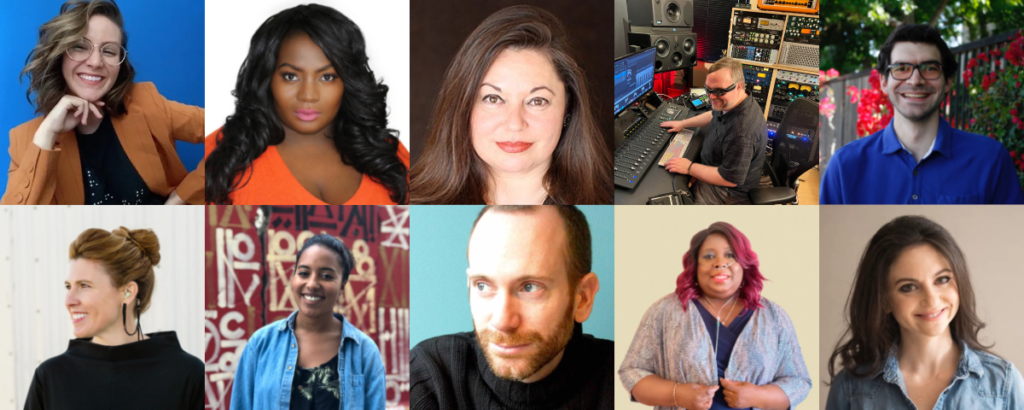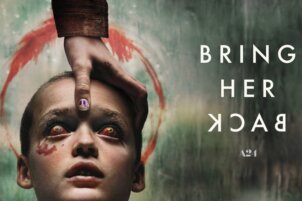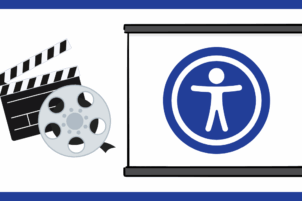
Top Row (L-R): Kiah Amara, Asha Chai-Chang, Michele Spitz, Chris Snyder, Alex Howard
Bottom Row (L-R): Amanda Upson, Amber Espinosa-Jones, Isaac Zablocki, Juliet Romeo, Danielle Pretsfelder-Demchick
Los Angeles, Oct. 4 – Throughout the RespectAbility Entertainment Lab, Fellows participated in a variety of panels and workshops focused on accessibility, a topic of major importance to both the Lab and the disability community as a whole. The conversations were run by industry professionals, many of whom are disabled themselves. The panelists covered topics including accessibility as a creative asset, audio description, accessible film festivals, and authentic and accessible casting.
Accessibility as a Creative Asset with Kiah Amara and Asha Chai-Chang
Kiah Amara and Asha Chai-Chang are both alumni of the RespectAbility Lab who now work as Production Accessibility Coordinators (PAC). Amara runs IndieVISIBLE, “a production group and artist collective empowering radical representation and intersectionality in the media industry.” During their talk, Amara emphasized the need to shift mindsets from what they called the “compliance mindset,” in which a person or entity does the bare minimum to be accessible, to an “access mindset,” which entails creating a state of easy engagement for everyone through the use of accommodations.
For example, many productions are not made accessible for fear that it will be costly. In reality, most workplace accommodations cost between $50 and $500, while many common accommodations are free or no additional cost including: offering remote work options whenever possible, always turning on automatic captions for Zoom meetings, listing ingredients for all food on set, making call sheets and scripts available in Dark Mode, selecting a wheelchair-accessible trailer instead of an inaccessible one, and offering pronouns on contact lists. In addition, Chai-Chang suggested that people use the safety meeting to let people know of their needs.
Essential Audio Description with Michele Spitz, Chris Snyder, and Alex Howard
The next panel, moderated by Michele Spitz, taught participants about the importance of audio description. Audio description tracks allow people who are blind or have low vision to fully enjoy visual media, including movies, television shows, and videos, by verbally describing what is being shown on screen. Spitz owns an audio description consultation and production company called Woman of Her Word. She educates people on the importance of audio description and offers narration and production services. As a philanthropist, Spitz has been raising media accessibility awareness by implementing and funding AD production grants for the past nine years.
Chris Snyder, who is blind himself, has narrated and produced audiobooks and audio descriptions for more than 20 years. He emphasized that sighted people enjoy audio descriptions too, including some autistic people and long-haul truckers, who can experience movies while focusing on the road. He described audio description as a craft – a hybrid of art and science – and argued that it need not detract from a writer’s creative process. Through dialogue that contains visual information, audio description can be written into a script. Instead of a character asking, “Why are you wearing that,” they can ask “Why are you wearing that green alien costume?” This allows blind and low-vision audience members to be in on the joke. When that is not possible, Spitz advised writers to leave space in the script for audio description, so they do not interfere with dialogue.
Alex Howard, who is an alumnus of the RespectAbility Lab and has low vision, shared his experience as an avid movie-goer, saying that going to the movies can be stressful. He has to get headphones from the front desk to access audio descriptions, and will not know until the movie starts if the headphones work, since audio descriptions are unavailable for the trailers. For Howard, audio description adds layers to movies, making them funnier or scarier depending on the genre. He plans to start a podcast with one of his friends to bring awareness to audio description and show people that vision disabilities are not antithetical to enjoying films.
Accessible Film Festivals with Amanda Upson, Amber Espinosa-Jones, Isaac Zablocki, and Juliet Romeo
Film festivals are paramount for so many reasons, including for new filmmakers getting their films in front of an audience, as well as for networking and career development, even if filmmakers’ films are not in the festival. However, few of them are accessible to disabled people. As such, Lab alumna and FWD-Doc’s Interim Director Amanda Upson shared the importance of the Film Event Accessibility Scorecard, to allow festival goers an opportunity to provide meaningful feedback that can help event organizers create more accessible events.
Several individuals have created festivals with accessibility in mind. Isaac Zablocki founded ReelAbilities, the largest disability-centric film festival in the country. Zablocki started the festival because he wanted a festival designed with accessibility in mind. Juliet Romeo, another RespectAbility Lab alumna, founded Slamdance’s Unstoppable film program because festivals she attended were inaccessible, and she wanted to see more disability inclusion in film festivals. Slamdance, according to Romeo, “is about support.” Romeo credited the RespectAbility Lab for Slamdance having captions and ASL interpreters, stressing that being disabled does not automatically mean a person understands every other disabled person’s needs, which is why collaboration and meeting people with different types of disabilities is important.
Oftentimes, volunteers are unaware of accessibility features and accommodations, so it is important to have a specific place for people to go with their questions. Zablocki mentioned that ReelAbilities now has an accessibility desk, where festival-goers may inquire about specific accommodations.
Another issue of accessibility at some festivals is cost. As such, many larger festivals offer waivers for members of various communities, including disabled filmmakers. Amber Espinosa-Jones, who is the Senior Manager of Artist and Audience Impact Sundance, encouraged people who cannot afford festival fees to ask if they have any waivers or discounts. In partnership with its Allied Organizations, of which RespectAbility is a member, Sundance Film Festival has provided waivers and discounts.
Espinosa-Jones also talked about her team’s involvement in pushing for DEIA initiatives at Sundance. “RespectAbility played a key part in the formation of our Equity, Impact, and Belonging department,” she added.
Authentic and Accessible Casting with Danielle Pretsfelder-Demchick
Danielle Pretsfelder-Demchick is an active member of the New York casting community, committed to increasing inclusion, accessibility, and authentic representation in the industry. When speaking with Lab Fellows about casting, she emphasized that casting directors must think outside the box and ask questions like “why can’t a disabled actor play a role that does not involve disability?” At the same time, disability is not a monolith. The fact that an actor has a limb disability does not mean they should play a character with cerebral palsy.
Pretsfelder-Demchick has noticed a trend in casting actors with less-noticeable disabilities. Sometimes, casting breakdowns are even changed to reflect this. For instance, a casting call for a character with cerebral palsy who uses a wheelchair may be changed to a character with cerebral palsy who walks. Some people would attribute this to lateral ableism, or ableism targeting a specific group of impairments. She urges casting directors to examine their own biases and educate their staff to create a safe space for disabled actors and staff.
Whether it’s a film set, a movie theater, or a film festival, when disabled people feel welcome, everyone wins. This is why accessibility needs to be at the forefront of the entertainment industry’s goals.







